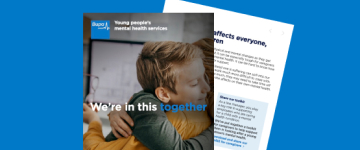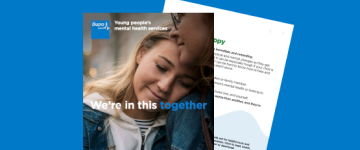Children in need of mental health support
We are facing a crisis in children’s mental health. The NHS estimates that the number of seven to 16-year-olds with a probable condition jumped from
12% in 2017,
to 16.7% in 2020, the first year of the pandemic.1
This means that one in six 16-year-olds are likely to be struggling with poor mental health.
And the Children’s Society, a charity which has been tracking children’s mental health since 2009, believes the real number is higher.
It estimates the likelihood of a young person having a mental health problem climbed by 50% from 2019 to 2022.2
Ingrained drivers
The pandemic is undoubtedly a factor, but there are also more deeply ingrained drivers for this worrying deterioration in children’s emotional wellbeing.
The Children’s Commissioner, Dame Rachel de Souza acknowledges,
“This generation of children has experienced uniquely uncertain and challenging times.3
“Some have spent some of their most formative years isolated and indoors, fearful they or their loved ones may catch a deadly virus.
“Their education has been disrupted and many have seen their parents struggle to cope with rising inflation and a cost-of-living crisis.”
Bombarded
Childhood is also changing. As Dame de Souza says,
“Children are constantly bombarded by negative news, of wars and climate catastrophe.
An increasing number are exposed to the harmful impact of social media, cyber bullying, and online exploitation. Crucially — not all children have the support system and protective factors they need to thrive in these difficult circumstances.”
Inevitably, this explosion in the number of children and teens reporting poor mental health has led to a huge increase in referrals to Children and Young People’s Mental Health Services (CYPMHS).
The latest data shows that in England alone,
almost a million children and young people were referred to CYPMHS in 2022 to 2023.
that is 8%, or one in 13 children and young people.4
Delays in care
Of those who were referred,
270,000 (28%) were still waiting for support
and 372,800 (39%) had their referrals closed before they received any help.4
It is difficult to gauge the impact of these barriers to accessing care because a third of CYPMHS referrals are recorded as being for ‘unknown’ problems.4
In fact, “unknown” is the most common reason for referral, followed by anxiety, “in crisis”, neurodevelopmental conditions (excluding autism), depression, and self-harming.3
Research by the charity Young Minds provides some worrying insights into the levels of distress caused by delayed care.
Distress
Their survey of almost 14,000 under-25s found that
more than a quarter (26%) who were waiting for mental health support had attempted suicide
and more than half (58%) said their mental health had deteriorated as a result of delayed care.5

Farimah Darbyshire, Director of Strategy and Development, MindForward Alliance (formerly City Mental Health Alliance) says,
“The toll that this mental health crisis is taking on young people and their families is immeasurable.
“Poor mental health in children has a ripple effect on the mental health across the family. Our research shows that 68% of parents are concerned about their children’s mental health. Of those people, 60% admit this is impacting their own psychological wellbeing.6
“Moreover, 35% of parents don’t feel comfortable talking to their child(ren) about mental health so it can be very challenging for the family. Our parents and carers toolkit supports parents to understand what their children may be going through and signposts to support for them to have a conversation.”
Farimah explains,
“It is important that children get the support and understanding that they need to recover and stay well. We know that three quarters of life-long mental health problems emerge before the age of 25.” 7
“Adolescence is a particularly vulnerable time because the prefrontal cortex, the area of the brain which governs essential life skills such as planning, prioritising and making good decisions, continues to mature until well into their twenties.
“This is a challenge, which every part of society must address.” 8
Adolescence is also a period of rapid development and pruning of the synapses which essentially hard-wire the way our brains work, and this influences our lifetime risk of poor mental health.9
However, this also means that positive interventions, such as cognitive behaviour therapy, can help young people develop the habits and coping strategies that support good mental health for life.
Explore our guides and resources

Manager’s Guide:
Supporting employees with their children’s mental health
The stress and worry we feel when a loved one is suffering can spill into our lives and make the pressures of work difficult. Learn more in our manager’s guide.

Caregivers toolkit:
Looking after a young person’s mental health
If you’re looking to better support your child’s wellbeing, we offer guidance and support for your loved one, and yourself in our helpful guide.

Supporting young people’s mental health
When it comes to mental health, it takes all of us to make a difference. Parents, young people, managers, businesses and healthcare providers.
1 NHS England, November 2022
3 Gov UK, Children’s mental health services 2022-23
4 Children’s Commissioner, over-a-quarter of a million children still waiting for mental health support, March 2024
5 Young Minds.Org, mental health waiting times harming young people
6 Mind Forward Alliance, Impact of children’s mental health on working-parents
7 National Library of Medicine, Kessler RC, Berglund P, Demler O, Jin R, Merikangas KR, Walters EE, June 2005, DOI: 10.1001/archpsyc.62.6.593.
8 National Library of Medicine, Arain M, Haque M, Johal L, Mathur P, Nel W, Rais A, Sandhu R, Sharma S, 2013, DOI: 10.2147/NDT.S39776.
9 University of Cambridge, Mental health disorders: risks and resilience in adolescence, 10 Oct 2018.


